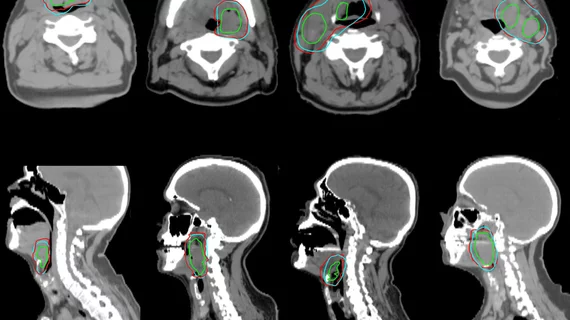Texas center reduces radiation targeting variability with deep learning
A deep learning algorithm deployed at MD Anderson Cancer Center in Houston successfully automated and standardized clinical target volumes (CTVs) for radiation therapy in head and neck cancer patients.
Researchers, led by Carlos E. Cardenas, with MD Anderson in Houston noted that while standard guidelines are available to outline site-specific CTVs, variability amongst physicians still looms—a key issue the team solved in their research.
“This variability in delineation and the heterogeneity in clinical practice have hindered our ability to systematically assess the quality of the radiation therapy plans and are considered major sources of uncertainty,” Cardenas et al. wrote in the study published in the June issue of the International Journal of Radiation Oncology *Biology* Physics.
Cardenas and colleagues created their algorithm using deep auto-encoders that accurately identified contouring patterns of physicians at MD Anderson, according to the study.
The team used data from 52 oropharyngeal cancer patients who had their gross tumor volumes and CTVs contoured at MD Anderson between January 2006 and August 2010.
Results showed the deep learning contours were in “close agreement” with those performed manually by trained radiation oncologists, authors wrote.
The team noted their method could also “have the potential to greatly reduce physician contouring time,” and it is likely easily replicable at other institutions.
“Our results are promising because our approach can be implemented in multiple institutions to improve standardization of radiation therapy, which could, in turn, reduce uncertainties in radiation therapy clinical trials,” they wrote. “..this approach could be used to train physician—or institution-specific models to automate this process and retaining the patterns used for the desired clinical practice.”
The latter claim was outside the scope of the study and was not evaluated. They wrote this would have to be tested in further research.

